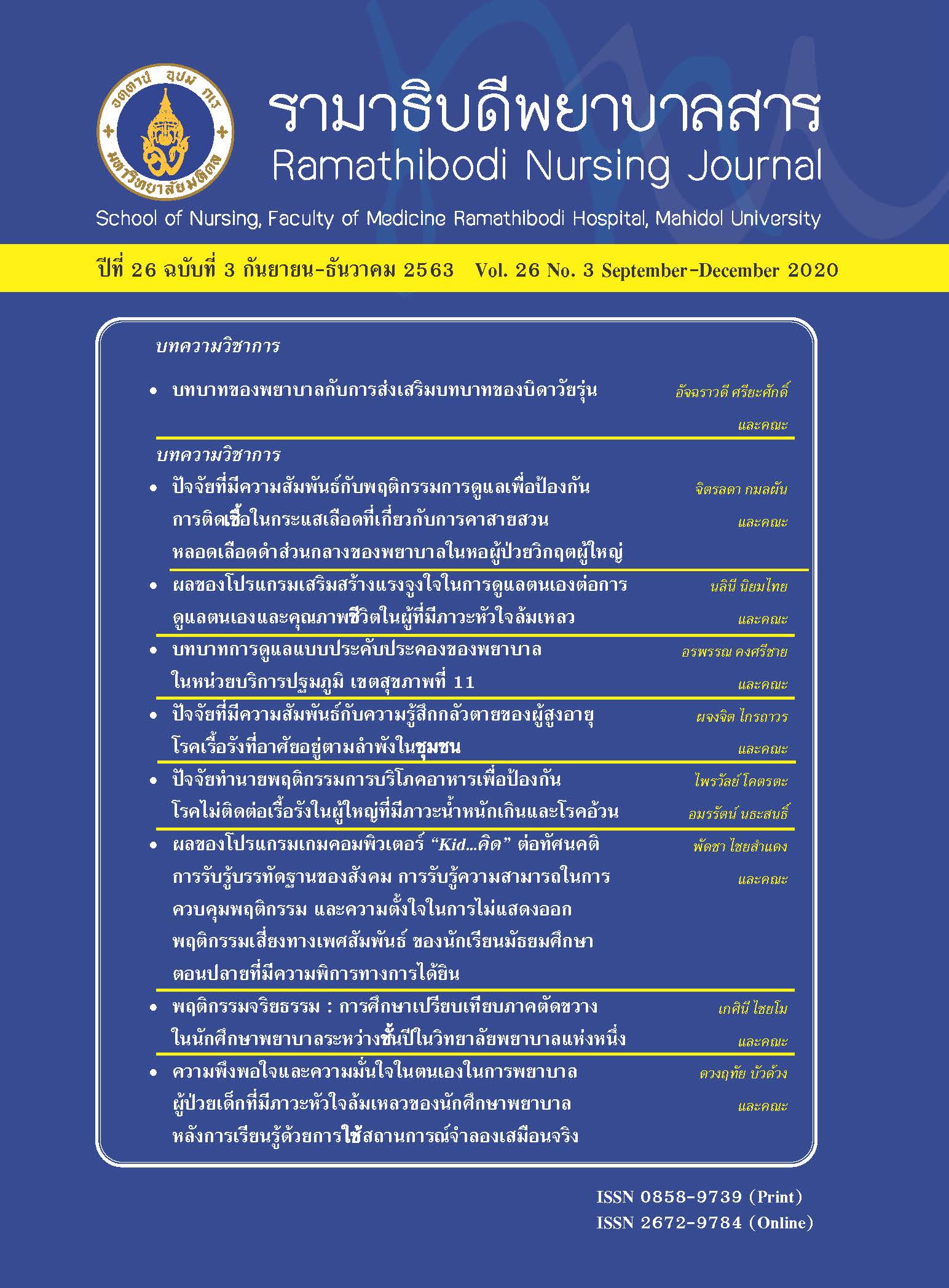Ethical Behavior: A Comparative Cross-sectional Study among Nursing Students in Different Class Years at a Nursing College
Main Article Content
Abstract
The purposes of this descriptive research were to explore the ethical behavior of nursing students and compare the ethical behavior among nursing students in different class years, from the first year to the fourth year. The accessible population were 507 nursing students in the bachelor’s program at Boromarajonani College of Nursing, Chonburi Province. Participants were asked to respond to the Moral Virtues Scale for Nursing Students. Descriptive statistics, Kruskal-Wallis test, and Mann-Whitney U test were used for data analysis. The results revealed that all nursing students from the first year to the fourth year exhibited a high level of the overall ethical behavior. The ethical behavior dimensions that had the highest level included discipline, punctuality,honesty, and appropriateness, while those in the high level included compassion, patience, justice,professional responsibility, caring, and cooperation. For the comparison of the overall ethical behavior among students, the first-year students had significantly higher overall ethical behavior than the third-year and the fourth-year students. Likewise, the second-year students had
significantly higher overall ethical behavior than the fourth-year students. For the ethical behavior dimensions, the first-year students had significantly higher discipline and honesty than any other classes, higher cooperation than the third-year and fourth-year, and higher compassion, justice,professional responsibility, and caring than the fourth-year students. The second-year students had significantly higher justice, caring, and cooperation than the fourth-year students. The thirdyear students had significantly higher caring than the fourth-year students. However, there were no differences in punctuality, patience, and appropriateness among the first-year to fourth-year nursing students. These findings suggest that administrators of the bachelor program should develop a system to continuously assess and monitor ethical behavior of nursing students from the firstyear to the fourth-year students to sustain the ethical behavior as a standard of nursing care.
Keywords: Ethical behavior, Virtue, Nursing education, College of Nursing, Nursing students
Article Details
บทความ ข้อมูล เนื้อหา รูปภาพ ฯลฯ ที่ได้รับการตีพิมพ์ในรามาธิบดีพยาบาลสาร ถือเป็นลิขสิทธิ์ของวารสาร หากบุคคลหรือหน่วยงานใดต้องการนำทั้งหมดหรือส่วนหนึ่งส่วนใดไปเผยแพร่หรือเพื่อกระทำการใด ใด จะต้องได้รับอนุญาตเป็นลายลักษณ์อักษรจากรามาธิบดีพยาบาลสารก่อนเท่านั้น
References
Plakdeesri S, Puttapitukpol S, Ruammake L. The development of the work motivation enhancement program
by dialogue for professional nurses at Chon Daen Hospital,Phetchabun Province. Veridian E-Journal, Silpakorn
University. 2012;5(3),446–67. (in Thai)
Deephaisarnsakul P. Expectation and perception of the clients about the service quality of the hospital. Veridian E-Journal Veridian E-Journal, Silpakorn University.2013;6(1),229-48. (in Thai)
Hongladarom T. Professional ethics and ethics. Unpublished manuscript; 2007.
Thompson, I.E., Melia, K.M., Boyd, K.M., and Horsburgh, D. Nursing ethics. 5th ed. Edinburgh: Elsevier;
Chaowalit A, Intarasombat P, Suttharangsee W,Kunaviktikul W, Suwanachart P. Ethics teaching manual
in Baccalaureate Nursing Program. Unpublished manuscript. Ministry of University Affairs; 2002.
Chaowalit A, Suttharangsee W. The development of the Bachelor of Nursing Science Program in Ethics. The 3rd
National nursing education document, about the development of educational administration, Bachelor of
Nursing Program in response to the reform of the Thai health service system. Bankok: Saksopha Printing; 2001.
Fry ST. Ethics in nursing practices: a guide to ethical decision making. 3rded. Singapore: Utopia; 2008.
Chaowalit A, Nasae T. Ethics Education in Baccalaureate Nursing Program. Songklanagarind Journal of Nursing. 2016;36(Supplement),183-95. (in Thai)
Naksrisang W, Triaudromsri S, Sroysungwan T. The promotion of morals and ethics of nursing students in the
st Century. Nursing Journal of the Ministry of PublicHealth. 2017;27(3),32-45. (in Thai)
Sansomros W, Yomdit Y, Yaowarat N, Sawangket A,Doungchan N. Moral virtues of nursing students: case study Boromarajonani College of Nursing, Ratchaburi. Journal of Nursing and Education. 2017;10(4),144-59. (in
Thai)
Boonmee P, Yana B. Ethical decision making among nursing students at Boromrajonani College of Nursing,
Phayao. Nursing Public Health and Education Journal.2015;14(2),35-42. (in Thai)
Prompahakul C, Nilmanat K. Moral competence in nursing practice amongst nursing students at Prince of SongklaUniversity.2017; 32(4),67-78. (in Thai)
Orathai P, Kerdonfag P. Development of the moral virtue indicators for nursing students. Ramathibodi Nursing Journal. 2010;16(3),350-63. (in Thai)
Wiratchai N, Na Wichian S, Orathai P. A survey and synthesis of the moral virtue indicators. Bangkok:
Prigwhan Graphic; 2008. (in Thai)
Klaimanee S, Thipsungnoen T, Pongsuwan K. Ethical behavior of nursing students at Boromrajonani College of Nursing, Nakhonratchasrima. Journal of Nursing and Education. 2013;6(special),89-103. (in Thai)
Kohlberg, L. Moral stages and moralization. In Lickona,T. (ed.), Moral development and behavior: theory,
research and social Issues. New York, Holt, Rinehart and Winston; 1976.
Sirilai S. Ethics for nurses. 13rd ed. Bankok: ChulalongkornUniversity Press; 2013.
Orathai P, Tengkiattrakul S. Perioperative nurses’ caring behaviors perceived by perioperative patients at Ramathibodi Hospital. Ramathibodi Nursing Journal. 2008;14(2),197-208. (in Thai)


